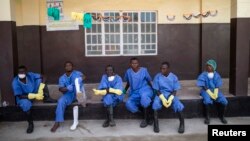The International Atomic Energy Agency (IAEA) has announced a new project that will help African doctors better diagnose the Ebola virus. The project is part of the agency’s Peaceful Uses Initiative that was launched in May of 2010.
The initiative aims to reinforce a commitment by the United States and other donors to IAEA activities to promote peaceful uses of nuclear technology in areas such as human health, food security, environmental protection and water resource management.
The agency says the effort will provide virologists in 11 African countries with high-quality training and cutting-edge equipment based on molecular biology. They in turn will be able to more quickly and more safely diagnose infectious and deadly diseases such as Ebola.
The countries involved in the project are Ivory Coast; Guinea, Liberia; Mali; Mauritania; Niger; Nigeria; Senegal; Sierra Leone; South Africa and Uganda.
The United States has contributed $1 million to the IAEA to help fund the initiative.
Michel Warnau, who heads the Africa section of the IAEA’s Department of Technical Cooperation in Vienna, Austria, explained how the molecular biology approach described as RT-PCR will help doctors diagnose Ebola more quickly.
“So it’s reverse transcription polymerase chain reaction, and this technique is amplifying the genetic material of pathogens and allows identifying the virus, for instance, in the case of the Ebola virus,” explained the IAEA scientist.
The project will train virologists in Africa to use RT-PCR to identify diseases, especially those that can be transferred from animals to humans. They will also receive training on how to work more safely in high risk medical environments such as laboratories used to diagnose Ebola.
Warnau said the funding for the project has been received and initial stages of its implementation have begun. A meeting has already been scheduled for some time in February 2015.
“We’ll start by a coordination meeting with world experts on molecular biology techniques and the training will be starting as soon as possible [hopefully]….in March or April of this year,” he said. He added that the project is part of a broader initiative to strengthen the capacity of Africa to anticipate and be prepared for outbreaks such as Ebola.
“This first activity started in 11 countries that are let’s say the most at risk, either because they are affected by the Ebola virus or because they are bordering these countries, or from road or air traffic,” Warnau emphasized, “but in the broader project, all of the African countries are targeted.”
The immediate goal of the project is to fully train between four and five virologists in all of the selected countries to use the molecular biology technique of RT-PCR in diagnosing emerging diseases.




